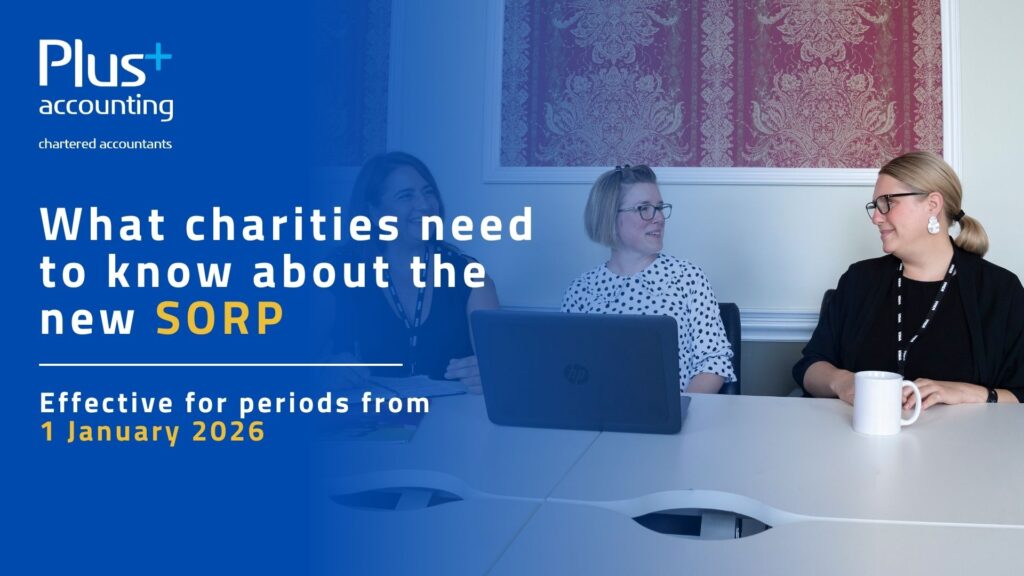The Charities Statement of Recommended Practice (the SORP) is being updated, and the changes will apply to accounting periods beginning on or after 1 January 2026. These updates are designed to make charity accounts clearer and more proportionate but they also introduce new disclosure and classification requirements that trustees, finance teams and advisers need to be aware of.
We have summarised the key changes below and set out practical steps to ensure that your charity stays compliant.
Who does the SORP apply to?
The SORP applies to charities preparing accruals-based accounts under UK accounting standards. If your charity prepares receipts & payments based accounts then the SORP does not apply.
Changes
- Three-tier reporting model — the SORP introduces proportionate reporting requirements for charities at different income levels so the burden of disclosure better fits the size of the charity.
- Longer qualifying/assessment focus on activity — clearer tests to demonstrate that a company is genuinely trading (not mainly investment) and how mixed-use activities are treated.
- Greater transparency & user-focused disclosure — charities will be expected to present information that’s more useful to donors, beneficiaries and stakeholders (clearer narrative on strategy, performance and stewardship).
- More modular SORP structure — guidance is presented in modules (making it easier to find sector or specific guidance).
Why these changes matter
The updated SORP aims to improve public trust and make charity accounts more understandable. This means more focus on how you record activities, classify income, and explain the charity’s performance. If your records, systems or board reporting aren’t already structured to produce clear narratives and segmented disclosures, additional work may be required at year-end.
Practical implications for charities
1. Prepare for tiered reporting
The new three-tier model means the level of disclosure expected will change depending on your income and/or size. Larger charities will need more detailed notes and narrative while smaller charities will have a more proportionate requirement. Review which tier you fall into and map the additional information you’ll need.
2. Check whether your activities are “trading” or “investment”
Some charities combine trading and investment activities. The SORP emphasises clear classification. If the non-trading activities are substantial then disclosures and relief/valuation treatments may differ. Now is the time to document and, if necessary, restructure mixed activities so they reflect the SORP tests.
3. Strengthen narrative reporting
Trustees’ annual reports will need to be clearer about strategy, impact, and stewardship of resources. Collect measurable outcomes and case studies throughout the year so your year-end narrative is robust and meaningful.
4. Improve systems & audit trail
The modular SORP means specific disclosures (e.g. on related parties, income categories, fixed assets) may be expanded. Ensure your bookkeeping and document management capture the evidence you’ll need — including contracts, restricted-fund records and donor conditions — and that your accounting software can tag and report by fund, activity and restriction.
5. Get your timetable in place
These changes are effective for accounting periods starting 1 January 2026. If your charity’s year-end straddles that date, plan how you’ll apply the new SORP for the next set of accounts and allow time for drafting trustee reports and additional disclosures.
How Plus Accounting can help
The updated SORP needs preparation — not ideal to leave until year-end. Plus Accounting can support charities with:
- Gap diagnostic — a short review of your current accounts, processes and trustee reporting against the new SORP requirements.
- Chart of accounts & systems changes — we’ll help you reorganise your bookkeeping (Xero/Dext) so disclosures are automated where possible.
- Trustees’ report support — drafting and structuring narrative content so it tells your story clearly and meets SORP expectations.
- Training for finance teams — hands-on sessions to ensure your in-house team can capture the right data during the year.
- Audit & assurance readiness — preparing schedules and supporting documentation to make audits or independent examinations efficient.
Further reading & official guidance
- Gov.uk announcement on updated SORP and consultation. GOV.UK
- Charities SORP official documentation and downloads (modular SORP). SORP
- Practical charity sector commentary and briefing. Stewardship
If you’d like help interpreting how the new SORP affects your charity, contact our team.
Author: Chris Morey, Audit and Assurance Director, Plus Accounting
Any views or opinions represented in this blog are personal, belong solely to the blog owner, and do not represent those of Plus Accounting. All content provided on this blog is for informational purposes only. The owner of this blog makes no representations as to the accuracy or completeness of any information on this site or found by following any link on this site. Please note that AI has been utilised in generating content for this blog.
Date Published: 24 September 2025



